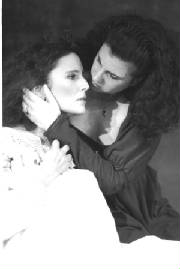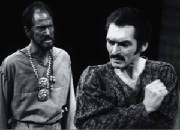In this production the tragedy is not in the downfall of a great man but rather in the cold-blooded murder of two marvelous and heroic women, Desdemona and Emilia. We view the production from a woman’s as well as a man’s point of view. We show the results of a male-dominated society where vanity, ego and appearance dominate rational and logical considerations and where women are treated as property and second-class citizens. It is a stinging indictment of the warrior mentality of Othello and the analytical yet maniacal and inhuman mentality of Iago.
We view the production from a woman’s as well as a man’s point of view. We show the results of a male-dominated society where vanity, ego and appearance dominate rational and logical considerations and where women are treated as property and second-class citizens. It is a stinging indictment of the warrior mentality of Othello and the analytical yet maniacal and inhuman mentality of Iago.
We see Othello not as great man but rather as a very flawed individual who happens to be an outstanding warrior. Self-delusion is at the core of his character. His greatest flaws are his refusal to face the reality of his nature and his firm belief that he has the right to be judge, jury and executioner. Watching him we learn the importance of humility, of constantly questioning our motives, of knowing and admitting our weaknesses and failures and of constantly striving to improve ourselves. We are also reminded that no one except a legally appointed person, operating within the framework of a humanistic and ethical code, has the right to pass sentence on another human being. 
In Iago - unlike the standard portrayal of a dispassionate, unmotivated and coldly objective creature - we see an obsessive, irrational, subjective, compulsive, reckless, maniacal paranoid who is overwhelmed with hatred and yet has the incredible ability to present to the world an entirely different personality. He literally thrives on danger and excitement.
When he is most at risk and must create and react spontaneously is when he is most energized and fulfilled. His recklessness and self-destructiveness ultimately bring about his demise. He, like Othello is grossly deluded and lacking in self-knowledge. He prides himself on his objectivity and yet he is overwhelmed by irrational emotions. As we watch him we are constantly reminded that the intellect should be the servant, of the soul and, to quote Montaigne, “all other knowledge is lustful to him who has not the science of honesty and goodness.”
NEXT

